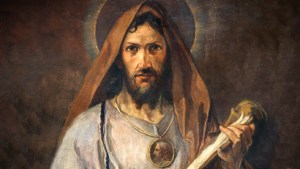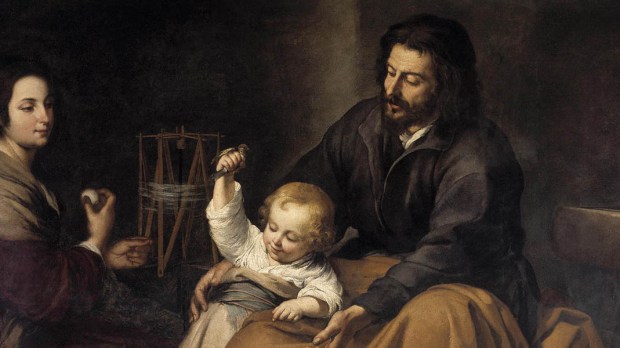Jesus chose, for a time in his life, to make himself completely dependent on his parents. Mary, and Joseph, her spouse, bore all the responsibilities of caring for an infant. While the Virgin Mary wouldn’t have been scrolling Amazon at three o’clock in the morning 2,000 years ago, she knew all the aspects of motherhood. She bathed the Christ child. She fed him. She snuggled him. Joseph too, tended to his cries. We can imagine him supporting the Blessed Mother, plying his every virtue to family care.
It’s all a lovely image. And yet, romantic scenes of life in the Holy Family are so much more than mere sentiment. Encountering the Holy Family is another way of understanding a fundamental Christian truth: Jesus is like us in all things, but sin.
Jesus had aunts, uncles, cousins. How could he have not known family celebrations? Marriage feasts? Rejoicings at new births? Mourning over death? Jesus would have watched his mother patiently care for his family. He saw the strong and faithful love that Joseph poured out over them. As the book of Sirach says, “God sets a father in honor over his children; a mother’s authority he confirms over her sons” (Sir. 3:2). God’s coming to earth is bound up inextricably with the basic expression of human community: the family.

Read more:
Was St. Jude the one getting married in Cana?
The family should be the first experience of love. Fathers and mothers should gaze with love on their children, accepting them as gifts from God, caring for them, loving them. Children, for their part, should look with love on what their parents, however imperfectly, have done: Seeing their virtues for what they are, and returning the first expressions of love with love. Thomas Aquinas describes the debt children have to their parents as “almost infinite.” He’s getting at the fact that there’s so much parents do and have done that can never be repaid.
In this way parents image God, who freely creates and gives of Himself. God, who made the world all the while wanting the best for men, offers humanity an invitation to enter into His love. He is a Father. A loving parent, he permits his children to choose whether or not to return this love.
Jesus, born of a Virgin, enters into this mystery. As an infant he subjects himself to the love and trials of family life. The family, which is Jesus’ chosen entrance to the world, begins to carry not only sociological, but salvific significance. Jesus did not come in a spaceship or a painting or merely as a written word. Out of all the possible ways to proclaim his saving truth to the world, he entered it as a baby. He came as part of a family. In this way, from the beginning, family life has been part of the plan of our salvation.
But sometimes our own families feel very far from the Holy Family. In some respects, this is no surprise. After all, the Holy Family comprised two people who had known no sin whatsoever, and a third who was “righteous.” Ordinary families are not like this one.
Further, we know so little about the actual life of the Holy Family. Theirs is a hidden life. Like contemplative nuns busy about the cloister, removed from the world, the life of the family at Nazareth remains obscure. There are so many details about the Holy Family that are shrouded: Whether the Holy Family was a dog family or a cat family. Whether Joseph preferred scrambled or over-easy eggs for breakfast. Mary’s favorite fabrics for making clothes. The kinds of toys Jesus played with.
Because of the hidden nature of the life at Nazareth and the utterly unique nature of their holiness, it won’t do at all to simply say, “we should be more like the Holy Family.” The Holy Family has to be something greater than a model; they have to be something more than characters we remember.
What is more powerful than merely a moral exemplar? A patron. We may not be as much like the Holy Family as we wish, but they are exactly like us. They see the joys and sufferings, the hopes and trials of our families, and they know them from the inside. Now numbered as “saints among the saints in the halls of heaven” the Holy Family can look on us at any moment, and shower forth the graces and mercy of heaven.
To be born into a Christian family means we will never, can never be alone. The mystery of our salvation is wrapped up in this mystery of communion. Cultivating holiness in family life does not consist in sending children to the best schools. It’s not achieved by buying a comfortable house or nice vacations. It’s not to have an ordered plan for the future. Our homes will be perfect when our relationships are perfect: when we’ve cast out sin and achieved true communion.
Sin is the only thing alien from the Holy Family. It’s the thing we long to drive out of our own families. We wish to be one in charity, to be in total communion. This is the promise of the Holy Family: to be made one. Jesus, Mary, and Joseph, Holy Family of Nazareth, obtain for us the grace of perfect love in family life!

Read more:
Where did the Holy Family live in Egypt?

